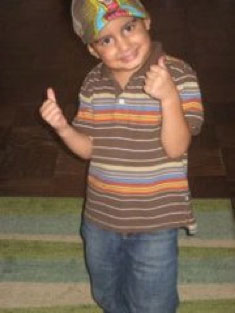Dr. Souweidane’s Phase 1 Trial Findings Published in Lancet Oncology

Cristian Rivera was only 6 years old when he lost his battle against DIPG. His parents started the Cristian Rivera Foundation to help find a cure; the foundation has been a loyal supporter of Dr. Souweidane's research.
Diffuse infiltrative pontine glioma, or DIPG, is a very rare, incurable brain stem tumor. A pontine glioma occurs in a most delicate area of the brain stem (the "pons"), which controls many critical functions, including breathing. Its location, as well as its infiltrating pattern, means a pontine tumor cannot be safely removed through surgery. Chemotherapy is frequently ineffective, since anti-cancer drugs cannot cross the blood-brain barrier and reach the tumor. Radiation is the most common treatment, but unfortunately the benefit is only temporary and does not provide a cure.
There are about 300 new cases of DIPG diagnosed each year, usually in children under the age of 10. Each of those new cases represents a devastated family struggling to find a cure for their child, but the odds are against them. Survival time for a child diagnosed with DIPG is measured in months, and there has been no significant increase in survival rates over the past three decades.
At Weill Cornell Medicine Pediatric Neurosurgery, under the leadership of Director Dr. Mark Souweidane, pioneering research is providing hope and the possibility for a cure. Dr. Souweidane is currently conducting an innovative clinical trial for DIPG, with a breakthrough approach in which anti-cancer agents are delivered directly to the tumor. Injecting a targeted radio-immunotherapeutic drug directly into the tumor avoids intruding on delicate brain stem tissue, and eliminates the need for medicine to cross the blood-brain barrier. Importantly, this approach also avoids the harmful effects of chemotherapy on the rest of the body. (Find out more about the clinical trial.)
Dr. Souweidane's research into this potentially life-saving procedure, and the clinical trial he's worked so hard to begin, are expensive initiatives. Major funding for cancer research often focuses on more common tumors, leaving children diagnosed with DIPG few options for new and investigative treatments like the one being tested. Thankfully, generous pediatric cancer foundations such as the Dana Foundation, The Cure Starts Now, the Cristian Rivera Foundation, the Beez Foundation, the Matthew Larson Foundation, and St. Baldrick's jumped on board early to support Dr. Souweidane's work, enabling his 12-year research and the FDA's approval for his promising first clinical trial. Dr. Souweidane is also grateful for the support of the many donors to the Children's Brain Tumor Project — a family-powered fund-raising initiative driven by those who have the greatest stake in this battle. Find out more about the Children's Brain Tumor Project.
But the work must continue, as we need to do so much more:
The Weill Cornell Medicine Pediatric Brain and Spine Center is a leader in searching for cures for rare pediatric tumors that are so significantly underfunded — or worse, ignored. We are deeply grateful for donations of any size, and thank you in advance for supporting this critical cause.
Won't you help? Make a donation today.
Reviewed by: Mark Souweidane, MD
Last reviewed/last updated: April 2022